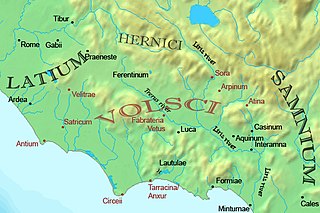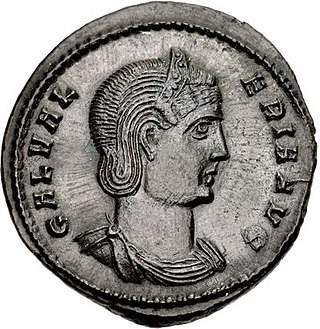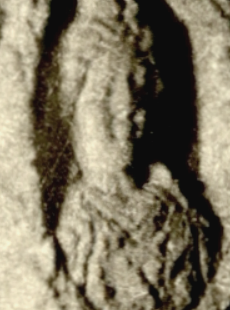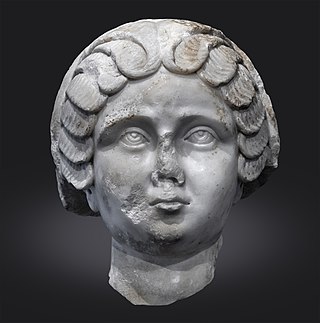Related Research Articles

GnaeusMarcius Coriolanus was a Roman general who is said to have lived in the 5th century BC. He received his toponymic cognomen "Coriolanus" following his courageous actions during a Roman siege of the Volscian city of Corioli. He was subsequently exiled from Rome, and led troops of Rome's enemy the Volsci to besiege the city.

The Volsci were an Italic tribe, well known in the history of the first century of the Roman Republic. At the time they inhabited the partly hilly, partly marshy district of the south of Latium, bounded by the Aurunci and Samnites on the south, the Hernici on the east, and stretching roughly from Norba and Cora in the north to Antium in the south. Rivals of Rome for several hundred years, their territories were taken over by and assimilated into the growing republic by 304 BC. Rome's first emperor Augustus was of Volscian descent.

Dionysius of Halicarnassus was a Greek historian and teacher of rhetoric, who flourished during the reign of Emperor Augustus. His literary style was atticistic – imitating Classical Attic Greek in its prime.

Coriolanus is a tragedy by William Shakespeare, believed to have been written between 1605 and 1608. The play is based on the life of the legendary Roman leader Gnaeus Marcius Coriolanus. Shakespeare worked on it during the same years he wrote Antony and Cleopatra, making them his last two tragedies.
Marcus Valerius Messalla Messallinus was a Roman senator who was elected consul for 3 BC.

Veturia was a Roman matron, the mother of the possibly legendary Roman general Gnaeus Marcius Coriolanus. According to Plutarch her name was Volumnia.

The gens Marcia, occasionally written Martia, was one of the oldest and noblest houses at ancient Rome. They claimed descent from the second and fourth Roman Kings, and the first of the Marcii appearing in the history of the Republic would seem to have been patrician; but all of the families of the Marcii known in the later Republic were plebeian. The first to obtain the consulship was Gaius Marcius Rutilus in 357 BC, only a few years after the passage of the lex Licinia Sextia opened this office to the plebeians.

Galeria Valeria was the daughter of Roman Emperor Diocletian and wife of his co-emperor Galerius.

Flavia Domitilla Major was the wife of the Roman Emperor Vespasian and mother of the emperors Titus and Domitian. She died before her husband became emperor in 69 AD. After her death she is thought to have been deified by the name Diva Domitilla.

Volumnia is a character in William Shakespeare's play Coriolanus, the mother of Caius Martius Coriolanus. She plays a large role in Coriolanus' life, encouraging him in his military success and urging him to seek political office. When the people of Rome put her son in exile and he joins their military enemies, she manages to persuade him not to besiege Rome and becomes a heroine to the city.

Prisca was a Roman empress as the wife of the emperor Diocletian.

Valeria Maximilla was a Roman Empress and wife of Emperor Maxentius.
The gens Vitellia was a family of ancient Rome, which rose from obscurity in imperial times, and briefly held the Empire itself in AD 69. The first of this gens to obtain the consulship was Aulus Vitellius, uncle of the emperor Vitellius, in AD 32.

Coriolanus is a 2011 British film adaptation of William Shakespeare's tragedy Coriolanus. It is directed by and stars Ralph Fiennes as the title character, with Gerard Butler as Tullus Aufidius, Vanessa Redgrave as Volumnia, and Brian Cox as Menenius. This is Fiennes' directorial debut. It places Shakespeare's original text and plot into a contemporary, pseudo-Balkan setting, reminiscent of the Yugoslav Wars.

Virgilia is the wife of Coriolanus in William Shakespeare's play Coriolanus (1607–1610), in which same play Volumnia is his mother.
Valeria or Valéria is a female given name dating back to the Latin verb valere, meaning strong, brave and healthy "to be strong".
Attius Tullius was a well-respected and influential political and military leader of the Volsci in the early fifth century BC. According to Plutarch, who calls him Tullus Aufidius, his home town was Antium. Tullius sheltered the exiled Roman hero Gaius Marcius Coriolanus, then incited a war with Rome, in which he and Coriolanus led the Volscian forces. He appears in William Shakespeare's tragedy Coriolanus under the name of Tullus Aufidius.
The Temple of Fortuna Muliebris was a temple in ancient Rome dedicated by Proculus Verginius Tricostus Rutilus in 486 BC to the goddess Fortuna and located at the fourth milestone of the Via Latina. It was founded on behalf of the Roman women who opposed the war of Gaius Marcius Coriolanus and the Volsci against Rome, commemorating their role in ending Coriolanus' advance on the city. The temple was dedicated in 486 BCE after the war and was formally founded in 493 BCE. Aside from some inscriptions recording restoration work in the Roman imperial period, no remains of the temple exist and the date it went into disuse is unknown.
Sacerdos Fortunae Muliebris was the title of the Priestess of the goddess Fortuna Muliebris in Ancient Rome.
References
 This article incorporates text from a publication now in the public domain : William Ramsay (1870). "Valeria". In Smith, William (ed.). Dictionary of Greek and Roman Biography and Mythology . Vol. 3. p. 1215.
This article incorporates text from a publication now in the public domain : William Ramsay (1870). "Valeria". In Smith, William (ed.). Dictionary of Greek and Roman Biography and Mythology . Vol. 3. p. 1215.